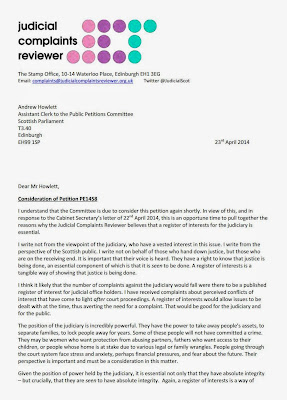MSPs seek more details from scripted responses of Lord Gill & Kenny MacAskill. IN the latest round of debate on proposals contained in Petition PE1458: Register of Interests for members of Scotland's judiciary – calling for the creation of a register of interests for Scotland’s judges, members of the Scottish Parliament’s Public Petitions Committee have again written to Scotland’s top judge, the Lord President Lord Brian Gill and Justice Secretary Kenny MacAskill, seeking their detailed views on new written evidence received from Moi Ali, Scotland’s Judicial Complaints Reviewer (JCR) – who supports proposals to create a register of judicial interests.
The move comes after JCR Moi Ali recently wrote to Holyrood’s Petitions Committee, supplying MSPs with eye opening evidence relating to how poorly the system of judicial complaints handling has operated in Scotland over the past two years, revealing that “..In the first 25 months of the new complaints regime, the Judicial Office's published statistics show that of 221 complaints there were 12 investigations, one judicial office holder apologised for his or her conduct and no judicial office holders were disciplined.”
Petition PE1458 Register of Interests for Scotland's Judiciary Scottish Parliament Public Petitions
Speaking during the latest debate at the Scottish Parliament’s Public Petitions Committee, SNP MSP John Wilson said “We seem to be at an impasse in relation to the petition. However, the latest submission from Moi Ali opens up a number of issues. From her unique position as the Judicial Complaints Reviewer, she has certainly brought forward more evidence—in my view, anyway—with regard to the current situation.”
Mr Wilson continued: “We have had a response from the Lord President and the Cabinet Secretary for Justice. However, I am keen that we get their current views in response to the latest information from Moi Ali. I hope that it will be more than the one-page, three paragraph response that we seem to get from the Lord President and the cabinet secretary—it is almost as if it is scripted. The Lord President comments that neither he nor the cabinet secretary is minded to open the matter to review.”
“It would be useful, prior to the debate in the chamber, for the committee to ask the cabinet secretary and the Lord President for their detailed views on the issues that the Judicial Complaints Reviewer has raised. Her submission raises a number of issues, in addition to those that she raised in oral evidence, that require more detailed scrutiny and a more detailed response from the Lord President and the cabinet secretary.”
Judicial Complaints Reviewer Moi Ali has gone on record supporting the creation of a register of interests. Writing in her letter to the Petitions Committee, Moi Ali said: “The position of the judiciary is incredibly powerful. They have the power to take away people’s assets, to separate families, to lock people away for years. Some of these people will not have committed a crime. They may be women who want protection from abusing partners, fathers who want access to their children, or people whose home is at stake due to various legal or family wrangles. People going through the court system face stress and anxiety, perhaps financial pressures, and fear about the future. Their perspective is important and must be a consideration in this matter.”
The JCR continued: “Given the position of power held by the judiciary, it is essential not only that they have absolute integrity but crucially, that they are seen to have absolute integrity. Again, a register of interests is a way of demonstrating that a judicial office holder is impartial and has no vested interest in a case –financially, through family connections, club/society membership or in any other way. Conversely, the refusal to institute a register of interests creates suspicion that in turn undermines judicial credibility. So once more, a register of interests is good for the judiciary and good for the public.”
Judicial Complaints Reviewer Moi Ali gave evidence to the Scottish Parliament’s Public Petitions Committee during September 2013 on proposals to create a register of judicial interests, reported previously here: As Scotland’s top judge battles on against transparency, Judicial Complaints Reviewer tells MSPs judges should register their interests like others in public life
After debating the latest evidence & responses to the petition, the Committee agreed to seek further detailed responses from the Lord President and Justice Secretary Kenny MacAskill, and a full debate is planned in the Scottish Parliament on the proposal to create a register of judicial interests.
The official record of the Public Petitions Committee consideration of Petition 1458 on 6 May 2014 is published below:
Judiciary (Register of Interests) (PE1458)
The Convener: Our first current petition for consideration today is PE1458, by Peter Cherbi, on a register of interests for members of Scotland’s judiciary. Members have a note by the clerk, which is paper 4, and the submissions.
Members will know that we sought permission from the Conveners Group to get a date for a plenary debate on the subject. The Conveners Group looked at that request and a date will be allocated in due course. Once we have it, we will ensure that members are informed. Members will also know that the Judicial Complaints Reviewer has supported the petition and that the petitioner urges us to ask Lord Gill for hysterical data on recusals, which we are still to follow up.
Chic Brodie: “Hysterical”?
Anne McTaggart: “Historical”.
The Convener: I meant “historical”.
Chic Brodie: You were probably right the first time. [Laughter.]
The Convener: The next step is to consider how we will deal with the petition. I suggest that we continue the petition until we have had a full debate on the matter in the chamber. I invite members to comment.
John Wilson: We seem to be at an impasse in relation to the petition. However, the latest submission from Moi Ali opens up a number of issues. From her unique position as the Judicial Complaints Reviewer, she has certainly brought forward more evidence—in my view, anyway—with regard to the current situation.
We have had a response from the Lord President and the Cabinet Secretary for Justice. However, I am keen that we get their current views in response to the latest information from Moi Ali. I hope that it will be more than the one-page, three paragraph response that we seem to get from the Lord President and the cabinet secretary—it is almost as if it is scripted. The Lord President comments that neither he nor the cabinet secretary is minded to open the matter to review.
It would be useful, prior to the debate in the chamber, for the committee to ask the cabinet secretary and the Lord President for their detailed views on the issues that the Judicial Complaints Reviewer has raised. Her submission raises a number of issues, in addition to those that she raised in oral evidence, that require more detailed scrutiny and a more detailed response from the Lord President and the cabinet secretary.
The Convener: Do members agree with John Wilson’s suggestion?
Members indicated agreement.
Angus MacDonald: I place on record that I am grateful for the additional information that the Judicial Complaints Reviewer has provided. It certainly presents us with some issues that we need to follow up, and I am happy to second John Wilson’s suggestion.
The Convener: If there are no further comments, are members happy with the proposed course of action? We will continue the petition, and there will be a plenary debate, with the date to be resolved. We need to chase up a couple of other issues with Lord Gill, in addition to addressing the points that John Wilson raised. Are members agreed?
Members indicated agreement.
Chic Brodie: Is the letter from the Judicial Complaints Reviewer on the website?
The Convener: Yes.
TOP JUDGE OPPOSES TRANSPARENCY OF JUDICIAL INTERESTS:
Scotland’s top judge Lord President Lord Brian Gill fiercely opposes calls for a register of judicial interests which would reveal the judiciary's vast personal, undeclared wealth, extensive family and business connections throughout the legal profession, links to big business, offshore trusts & investments, ownership of numerous and high value properties through a variety of ‘creative’ arrangements, directorships, shareholdings, and even unpublished criminal records of members of the judiciary.
Lord Gill has previously refused two invitations to appear before the Scottish Parliament to give evidence and face questions on his opposition to the proposal to create a register of judicial interests. The top judge has also used the Scotland Act as a loophole to avoid further scrutiny on the matter.
 Lord Gill’s use of Scotland Act against MSPs was reported in the media. Writing in a letter to msps, Lord Gill implied cooperation with Parliament would be withdrawn over calls to make judges more transparent in register : “Section 23(7) of the Scotland Act provides inter alia that the Parliament may not require a judge to attend its proceedings for the purposes of giving evidence. This is not a loophole. It is a necessary part of the constitutional settlement by which the Parliament is established. Its purpose is to protect the independence of the judiciary, a vital constitutional principle that is declared in section 1 of the Judiciary and Courts (Scotland) Act 2008”
Lord Gill’s use of Scotland Act against MSPs was reported in the media. Writing in a letter to msps, Lord Gill implied cooperation with Parliament would be withdrawn over calls to make judges more transparent in register : “Section 23(7) of the Scotland Act provides inter alia that the Parliament may not require a judge to attend its proceedings for the purposes of giving evidence. This is not a loophole. It is a necessary part of the constitutional settlement by which the Parliament is established. Its purpose is to protect the independence of the judiciary, a vital constitutional principle that is declared in section 1 of the Judiciary and Courts (Scotland) Act 2008”
The judge continued: “When a committee invites a judge to give evidence before it, I have to decide whether the subject matter might infringe the principle of judicial independence; and whether the evidence required could be satisfactorily given in writing.”
Previous articles on the lack of transparency within Scotland’s judiciary, investigations by Diary of Injustice including reports from the media, and video footage of debates at the Scottish Parliament’s Public Petitions Committee deliberations on Petition PE1458: Register of Interests for members of Scotland's judiciary can be found here : A Register of Interests for Scotland's Judiciary





